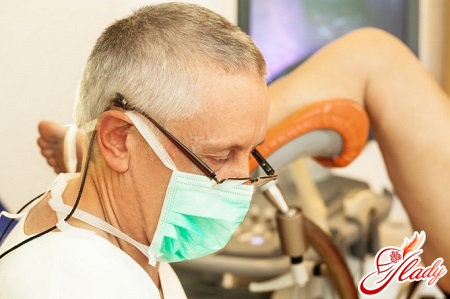
Vacuum abortion, sometimes called mini-abortionor vacuum aspiration, - this is a new approach to the technology of abortion by extracting the fetus with a special vacuum suction. This procedure is prescribed by a gynecologist at the patient's discretion or for medical reasons such as abnormal fetal development, a chronic disease that threatens the health of the mother and the unborn child. Vacuum abortion lasts about 5 minutes, and the woman can be discharged after an hour. Advantages of vacuum abortion:
- Ability to abort pregnancy up to 2 weeks from the day of delay;
- operation under anesthesia;
- the whole procedure lasts about 5 minutes;
- removal of the fetus by vacuum suction, which is the safest;
- the rehabilitation period after surgery is much lower;
- there is no need to expand the cervix;
- The risk of serious consequences is much lower.
Contraindications to vacuum abortion
To successfully perform the operation it is necessarypreparation, which provides for the exclusion of contraindications to abortion. Contraindications to vacuum aspiration are any gynecological, general inflammatory, infectious diseases. Also, a vacuum abortion will not be performed if a pregnancy has already been terminated, after which the period of -6 months has not yet passed. The deadline for an abortion is 5-6 weeks, so it is very important to monitor your cycle and know all the symptoms of pregnancy. This restriction is explained by the fact that during this period of time the fetus has not had time to strongly attach to the uterus and it is easy to remove it using vacuum suction. The earlier an unwanted pregnancy is terminated, the lower the likelihood of complications, but in any case, it is present, since artificial invasion of the body can have unpredictable consequences. An important contraindication to vacuum abortion is an ectopic pregnancy, which is life-threatening for a woman. An ectopic pregnancy is This is a serious pathology that requires immediate intervention by specialists, it is accompanied by pain and colic in the lower abdomen, as well as unusual discharge. Ectopic pregnancy is detected by transvaginal ultrasound.
Preparing for a vacuum abortion
Vacuum abortion is an operation, soit is necessary to prepare seriously. No doctor will undertake the operation without a general blood and urine test, PCR analysis for latent infections, bacteriological culture of flora, beta-hCG analysis, ultrasound, blood group analysis, syphilis, hepatitis and HIV tests, smear on flora. This list can be expanded if the woman is registered with a cardiologist or other specialist doctor. The purpose of passing the above tests is to determine the state of health with the identification of all sorts of contraindications or deviations that can worsen the woman's well-being both at the time of the operation and in the future. PCR analysis allows you to see microbes that a simple smear on flora cannot detect. Carrying out an operation in the presence of any infection can cause an inflammatory process of the uterus and lead to infertility. As for the blood test, it will reveal the internal state of the woman's body.
Anesthesia and surgery
Termination of pregnancy by vacuum methodAspirations are performed on an outpatient basis under anesthesia. A uniform negative pressure is created in the uterus. This helps the fertilized egg, which has not yet had time to tightly connect with the uterus, to separate easily from it, with virtually no bleeding. With a vacuum abortion, trauma to the cervix is excluded, since there is no need to expand it instrumentally. To minimize all possible complications, the operation is performed under the control of an ultrasound machine. Local anesthesia is most often used for vacuum termination of pregnancy, but general anesthesia can be used at the patient’s request. The operation must be performed in the presence of an anesthesiologist. The patient must be informed of the possible risks. Special drugs are administered to relax the cervix and contract its muscle layer. Then, using a special speculum-dilator, the vaginal mucosa is treated with an antiseptic. After the operation, the doctor must examine the aspirated contents to determine whether the fertilized egg has been completely removed. If no symptoms of complications appear within an hour after the operation, the patient is sent home. To exclude infectious complications, a special course of treatment is prescribed, which includes taking antibiotics and painkillers. Antiplatelet agents are contraindicated after an abortion, as they can provoke severe bleeding.
Rehabilitation and consequences
If after an abortion within 2 weeksThere is bloody discharge, this is normal. Cramps in the lower abdomen are also possible. Sexual activity in the postoperative period should be stopped for at least 2 weeks. It is not recommended to use tampons and douche. It is believed that a vacuum abortion is safer than a medical abortion. With a vacuum termination of pregnancy, bleeding passes much faster, and the likelihood of an unsuccessful operation is very small. After an abortion, you need to pay as much attention to yourself as possible. Rest more, do not be nervous. It is impossible to name a specific rehabilitation period, since it is individual for each woman. For some, 1 month is enough, and some cannot recover after six months. Of course, the most important role here is played by the general health of the woman during the operation. It is not allowed to play sports or lift heavy objects during the rehabilitation period. It is recommended to periodically measure blood pressure, temperature, pulse rate. If deviations from the norm are detected, you must consult a doctor. It is strictly forbidden to take hot baths, swim in pools and open water. It is very important to eat properly and nutritiously, since after an abortion the body is very depleted. To eliminate the risk of inflammation in the pelvis, empty your bowels and bladder in time. If the operation was performed before the 6th week of gestation, then there is a small probability (2%) that the pregnancy will survive. In case of refusal of abortion, there is a real chance of normal pregnancy development. But such probability is very small, therefore, as a rule, in such cases they resort to a repeated interruption. A repeated abortion is performed surgically.
Possible complications
The risk of complications after an abortion depends directly on:
- term of pregnancy;
- from the experience of a doctor;
- from the patient's state of health;
- from the number of abortions made;
- from the thoroughness of the preliminary examination.
There are 2 types of complications - early andlate. Early complications are inflammatory diseases, heavy bleeding, incomplete extraction of the ovum. Late complications include disruption of normal nutrition of the embryo during subsequent pregnancy. This happens during curettage of the uterus in case of an incomplete vacuum abortion, which leads to microtraumas of the cervix, forming scars on it.
Pregnancy after abortion
Conception after an abortion is possible already in the firstmenstrual cycle, so contraceptives are recommended to be taken immediately after the resumption of sexual activity. After an abortion, it is necessary to undergo a course of treatment and restore hormonal levels, since disturbances in the hormonal system during a subsequent pregnancy can provoke a miscarriage. Vacuum abortion can be called the most gentle method, but in any case - this is an artificial intervention that contradicts the laws of nature and can negatively affect the functioning of a woman's body, the ability to bear and give birth to a child in the future.









